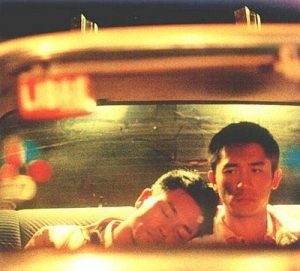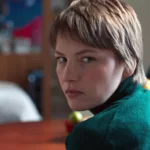Classic Cinema: Happy Together
Directed by Kar-Wai Wong
Starring Tony Chiu-Wai Leung, Leslie Cheung, Chen Chang
Reviewed by Michael Dalton
Love stories are a dime a dozen but few limit their narrative to exploring the implication of two people in love and all it entails. The fringe elements of broader tales can prove to be a major distraction and cheat us of its essence. Kar-Wai Wong’s 1997 masterpiece Happy Together, a study of frayed love, is only concerned with the cause and effect and it dissects it with brutal honesty.
Lai Yiu-fai (Tony Chiu-Wai Leung) and Ho Po-wing (Leslie Cheung) are lovers holidaying in Buenos Aires where their relationship starts to stumble and eventually break down. Just as we think it’s all over, a crisis reunites them but like all relationships of this sort, it soon reverts to its abusive nature. While, in emotional terms, never taking one side over the other, Kar-Wai’s instinctive narrative is seen from Lai’s perspective. Ho, we see, is the more promiscuous of the two. Often in the company of other men, he is emotionally ignorant and cruel. Wong shows Lai moving from job to job, constantly trying to save money to get back home, always battling the emotional torment the relationship has left him with.
No relationship is ever black and white. It undergoes changes and Wong utilises the fractured narrative to frame the inconsistencies accordingly. There will be laughter, tears, confusion, and violence and in keeping with these shifts, cinematographer Christopher Doyle, Wong’s long-time collaborator, films it in a dislocated style. Happy Together begins in black and white but as the relationship is once again attempted, Doyle washes the screen in lurid colours, signalling the shifting emotional tide.
When Lai works as a doorman in a nightclub, the scenes are dark and dim. It’s as gloomy as his situation. Even when Ho arrives flaunting his companions the hues don’t alter but when the lovers reunite one last time, the colours bloom again. The scenes in the little room they share are claustrophobic so Wong allows us some respite. When Lai takes a job in a kitchen, he meets the handsome Chang (Chen Chang) and it looks as though Lai may have found love after all. While it remains platonic, it is with Chang that Lai discovers a positive relationship that could bring happiness but the devastation that Ho has caused makes it impossible for Lai to welcome it.
Apparently, Leung was unaware of the confronting love scenes he would be filming when he arrived in Buenos Aires. You’d never know it. As Lai he delivers what remains the most devastating performance of his career. He is the hero of the piece and it’s fascinating to watch his emotions harden. He has a temper and he won’t be trampled on but he feels it all deeply and by the end we almost pity Ho, left alone and devastated.
Happy Together is filled with defining moments that offer startling insight into the inner turmoil of the destructive relationship. There is a moment where Ho storms out on Lai in a fury, leaving him to eat his dinner alone. Lai slowly continues to eat as if it’s a monumental effort; his feelings are so raw by this point that any emotional shock cripples him. The episode where Lai play nurse to Ho after the assault has a similar impact. Lai tells us in voiceover that these were the happiest days, that knowing Ho needed his help and compassion made him feel complete. Happy Together is a story of shattering truth.




